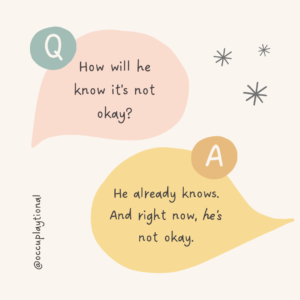If my partner and I were chatting and he said “Ughhh, I’m so stressed out by writing this dissertation, I could just throw my computer out the window!”
I wouldn’t say, “Well, you aren’t allowed to throw your computer out the window.”
I might say, “I know. I know it’s maddening.”
If my boss and I were talking and she said “Yet again I’m having to fight to get this kid what they need. It makes me want to scream!”
I wouldn’t say, “Screaming is a bad choice.”
I might say, “Yeah. That’s totally understandable.”
So when my child said to me, “I don’t want to brush my teeth! I want to break my toothbrush and throw it!”
I didn’t say, “You’re not allowed to break your toothbrush.”
I didn’t say, “Well, you have to brush your teeth.”
My child already knew those things. That’s the whole reason why they were saying them—to try to assert authority, to gain control, because they were hurting and sad and it felt to them like being powerful for a moment would help.
I said, “I get it, I know it’s hard.”
I didn’t say another word.
And then I held my child (and held their toothbrush so it couldn’t actually be thrown anywhere) for about half an hour on the floor of the bathroom while they cried about a dozen things that had nothing to do with a toothbrush really.
I brushed their teeth, which they still weren’t thrilled about. I’m not saying this because it’s a “trick” or because it “works” if your definition of “works” is that it makes children compliant in both action and emotion. My child doesn’t have to be compliant, especially not in emotions. There’s nothing to comply with; they can feel however they feel.
Then we went to their room and continued to have a deeply emotional bedtime because for whatever reason they had a lot of emotions to deal with right now, and this was how it came out.
I feel like it’s very common for adults to believe that if they don’t negate their child’s verbal expressions of frustration, then their child will “think that’s okay”.
“I want to hit you!”
“I’m going to throw you in the dumpster!”
“I’m never going to sleep ever ever EVER!”
You can watch them, or silently intervene, to make sure that an angry expression that is literally feasible (like throwing a toothbrush or hitting a sibling) doesn’t take place. Pick up the toothbrush and hold it, while not engaging in a verbal battle about it. Stand between the child and the sibling, or stand nearby—not like “I have to protect a victim from an aggressor,” but like, “The words being spoken here suggest that both sides of this social situation probably need adult support.”
And you can literally just let go of, or empathize with, angry expressions that are literally impossible (like putting someone in the garbage or never sleeping ever again). Nobody who’s using hyperbole, whether happy or sad or angry, enjoys having it pointed out to them that their hyperbole is not literal. Of course it’s not, it’s hyperbole.
Your child does and says these things when they are mad BECAUSE they already know they’re “not okay”. If they thought they were “okay”—enjoyable for the sake of themself, enriching to their lives, connecting with their adults—they would do them when they weren’t mad.

[Image description: Two cartoony word bubbles, one pink and one yellow, labeled “Q” and “A” (as in “question” and “answer”). The Q is: “How will he know it’s not okay?” and the A is: “He already knows, and right now, *he’s* not okay.” There are little doodles of stars out to the side as well, and my handle, @occuplaytional. End description.]



